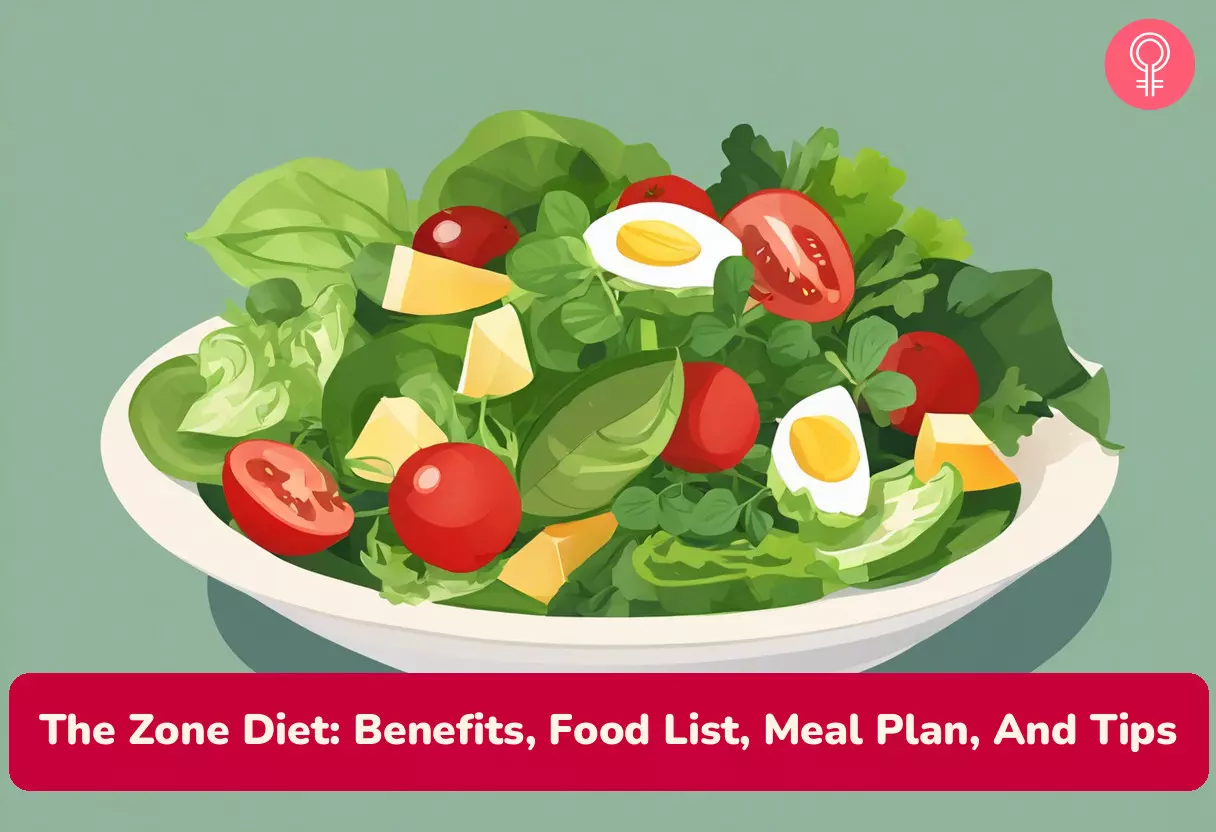It is more than just a diet – it is a systematic way of eating to manage weight and enhance your overall metabolism. In this article, we discuss everything you need to know about the Zone diet, including the way it works, its possible benefits, and a meal plan. Keep reading to know more!
What Is The Zone Diet?
The Zone diet is a popular nutritional approach developed by Dr. Barry Sears. It emphasizes the balanced intake of carbohydrates, proteins, and fats in a 40:30:30 ratio, respectively, to achieve optimal hormonal balance. The goal of the diet is to enter the “zone” where the body efficiently manages insulin and other hormones, leading to better health, weight loss, and improved physical and mental performance (1). This balance is said to make it easier to manage blood sugar levels, curb hunger, and reduce the risk of chronic diseases. Scroll down to know more!
How Does The Zone Diet Work?
The Zone diet works by regulating the balance of macronutrients in every meal and snack to achieve a specific ratio. Here is a brief breakdown of what it claims to do:
Hormonal Response Control: The diet helps control hormonal responses to food, particularly insulin, by maintaining a macronutrient balance and the body’s energy levels.
Inflammation Control: It emphasizes the consumption of foods low in saturated fats and high in monounsaturated fats to reduce inflammation in the body.
Structured Meal Planning: This diet plan follows a structured eating pattern (40-30-30 ratio) that prevents the possibility of overeating and promotes overall health.
Regular Eating Schedule: The diet encourages taking food in small quantities at regular intervals to maintain stable blood sugar levels and control hunger.
Fresh, Whole Foods: The Zone diet emphasizes the consumption of whole, unprocessed foods, like lean proteins, fruits, vegetables, and healthy fats that keep you healthy and fit, especially when paired with regular exercise.
While the Zone diet has gained popularity, all the claims mentioned above are not backed by in-depth research. Moreover, it may not be suitable for all. Consult a healthcare professional or registered dietitian before starting this diet to meet your individual dietary needs and goals. Check out the following sections to uncover the potential benefits it offers for weight management and beyond!
Benefits Of The Zone Diet
May Reduce Inflammation
Two hormonal systems in the body, insulin and eicosanoids, are impacted directly by dietary macronutrient intake. These hormonal systems also play a significant role in the inflammatory process of the body (2). Since this diet includes many low-glycemic, anti-inflammatory foods, it may help in the treatment of chronic inflammatory diseases such as type 2 diabetes, obesity, and cardiovascular issues (3).
May Improve Mental Health
Research shows that eating a balanced meal containing macronutrients, such as omega-3 fatty acids, carbs, and proteins, may help reduce the risk of certain mental disorders. It may also help individuals who are undergoing therapy or in the rehabilitation stage for any mental health condition and improve their mental well-being when paired with a healthy lifestyle and adequate physical activity (4).
May Improve Heart Health
A study found that eating foods high-glycemic index increases the risk of a cardiovascular health issue (5). Since this diet consists of healthy foods with low-glycemic index, it may help manage heart health. Research also shows that a macronutrient-rich diet, containing vegetables, fruits, dairy, fish, olive oil, and other health food, has cardioprotective protective properties that may aid heart health (6).
May Improve Athletic Performance
Research shows that high protein intake may aid athletic performance as it helps stimulate muscle protein synthesis. With the right protein and macronutrient intake on the Zone diet, personalized to your individual needs, you may improve your exercise performance (7).
May Aid In Weight Management
The specific macronutrient ratios of the Zone diet promote portion control and may optimize metabolism, which may lead to weight loss and easier weight maintenance. However, more research is needed to support this claim.
May Improve Blood Sugar Control
Sticking to the 40-30-30 ratio of the diet may help stabilize blood sugar levels and reduce insulin spikes by promoting a balanced intake of carbohydrates, proteins, and fats (8).
May Offer Appetite Control
Some individuals report feeling less hungry and experiencing better appetite control when following the Zone diet. It’s mainly due to high fiber and protein intake, which prevents overeating, helps you feel full for longer, and aids in better weight management.
May Boost Energy Levels
With the consistent and balanced meals taken at regular intervals on this diet, some individuals experience increased and sustained energy throughout the day. Eating healthy carbs also improves your energy levels, so you can exercise better and stay more active throughout the day.
May Reduce The Risk Of Alzheimer’s Disease
As you age, you need to increase your macronutrient intake to aid cognitive functioning. Controlling the intake of carbohydrates, proteins, and fats in a balanced way helps reduce the risk of Alzheimer’s disease by reducing inflammation (9). This kind of balanced intake can be achieved with the Zone diet.
May Improve Digestive Health
The Zone diet encourages healthy eating by balancing the consumption of healthy foods like fruits, vegetables, and grains. These food groups also offer good fiber content that may aid gut and digestive health. Cutting out unhealthy processed food may also improve bowel movements. Remember, individual experiences with the Zone diet can vary. Seek the advice of a healthcare professional before starting this diet. Now, let’s delve into how this diet aids better weight management.
Zone Diet For Weight Loss
The Zone diet is a good choice for individuals looking to achieve weight loss. It focuses on a specific macronutrient ratio to minimize blood sugar levels and optimize metabolic function while contributing to gradual and sustainable weight loss. Moreover, the Zone diet promotes portion control and nutrient-dense food choices, making it easier to manage calorie intake, which is essential for weight management. This diet also fosters satiety and is said to combat inflammation, a significant factor in weight gain, by focusing on low-glycemic carbohydrates and lean proteins. For those aiming for weight loss, the diet’s structured approach also provides a clear framework for meal planning and making informed food choices. However, like any diet, individual results can vary, and it is crucial to combine this dietary approach with regular exercise and lifestyle adjustments for optimal results. If you want to follow the Zone diet, you need to ensure you stock up your pantry with the right foods. Learn what foods you can eat on this diet in the next section.
Zone Diet Foods List
Foods that are commonly included in the Zone diet are:
1. Carbohydrates
Vegetables: Broccoli, spinach, cauliflower, Brussels sprouts, bell peppers, and cucumbers Fruits: Apples, berries (blueberries, strawberries, raspberries), oranges, pears, and peaches Whole grains: Oats, barley, quinoa, and brown rice Beans and legumes: Lentils, kidney beans, and chickpeas
2. Proteins
Lean meats: Skinless chicken breast, turkey, lean cuts of beef, pork, and lamb Fish: Salmon, mackerel, sardines, trout, herring, and other fatty fish Eggs: Preferably egg whites, and whole eggs in moderation Dairy: Low-fat cheese, yogurt, and milk Plant-based proteins: Tofu, tempeh, seitan, and edamame
3. Fats
Nuts: Almonds, walnuts, macadamia nuts, and pistachios Seeds: Flaxseeds, chia seeds, and sunflower seeds Olive oil and olives Avocados Fatty fish (which also counts toward protein intake)
Beverages
Herbal teas (unsweetened) Black coffee in moderation
Condiments (Sparingly):
Mustard Vinegar Hot sauce (without added sugars)
Herbs And Spices (For Added Flavor):
Fresh herbs like basil, cilantro, and oregano Spices like cinnamon, turmeric, and cayenne pepper Garlic and ginger
Remember, while these foods are typical for the Zone diet, it is essential to maintain the 40-30-30 macronutrient ratio in each meal. This balance, combined with portion control and regular physical activity, is at the core of the diet’s approach to health and weight management. Scroll down for an effective Zone diet meal plan.
7-Day Zone Diet Meal Plan
Day 1
Breakfast:
Scrambled eggs (3 egg whites and 1 yolk) with spinach and tomatoes 1/4 cup of cooked oatmeal A small handful of almonds (about 10-12)
Lunch:
Grilled chicken breast (4-6 oz) with a side salad (2 cups of mixed greens, cucumbers, and bell peppers) Dress the salad with 1 tablespoon of olive oil and 1 tablespoon of balsamic vinegar.
Dinner:
Baked salmon (4-6 oz) with a side of steamed broccoli (1 cup) 1/2 cup of cooked quinoa
Snack:
6 oz of Greek yogurt with 1/2 cup of mixed berries
Day 2
Breakfast:
6 oz of Greek yogurt with 1 teaspoon of honey and 1 tablespoon of chopped walnuts 1/2 cup of sliced strawberries
Lunch:
Turkey and avocado lettuce wraps (4-6 oz of turkey) with a side of sliced carrots (1 cup) 2 tablespoons of hummus for dipping
Dinner:
Stir-fried tofu (4-6 oz) with mixed vegetables (1 cup of broccoli, 1/2 cup of bell peppers, and 1/2 cup of snap peas) 1/2 cup of cooked brown rice
Snack:
Celery sticks (2-3 stalks) with 2 tablespoons of almond butter
Day 3
Breakfast:
Omelet with diced bell peppers and onions (3 egg whites and 1 yolk) A small serving of whole-grain toast (1 slice)
Lunch:
Grilled shrimp salad with mixed greens (2 cups), cherry tomatoes, and vinaigrette dressing (2 tablespoons)
Dinner:
Baked chicken breast (4-6 oz) with a side of roasted asparagus (1 cup) 1/2 cup of cooked quinoa
Snack:
6 oz of cottage cheese with 1/2 cup of pineapple chunks
Continue to follow this pattern for the following days, focusing on lean proteins, low-glycemic carbohydrates, and healthy fats. Adjust portion sizes to meet your individual needs, and consult a healthcare professional or registered dietitian if you have specific dietary requirements or health concerns. Find some healthy and delectable Zone diet recipes in the section below.
Zone Diet Recipes
1. Grilled Chicken And Vegetable Stir-Fry
Calories Per Serving: 300 calories, approximately Serves: 2 Ingredients
2 boneless, skinless chicken breasts (4-6 oz each) 2 cups of mixed vegetables (broccoli, bell peppers, snap peas) 1 tablespoon of olive oil 1 clove of garlic, minced 1/4 cup of low-sodium chicken broth 1 tablespoon of low-sodium soy sauce (or tamari for a gluten-free option) 1/2 cup of brown rice, cooked
How To Prepare
2. Greek Yogurt And Berry Parfait
Calories Per Serving: 250 calories, approximately Serves: 1 Ingredients
6 oz of Greek yogurt 1/2 cup of mixed berries (blueberries, strawberries) 1 teaspoon of honey 1 tablespoon of chopped walnuts
How To Prepare
3. Baked Salmon With Roasted Asparagus
Calories Per Serving: 300 calories, approximately Serves: 2 Ingredients
2 salmon filets (4-6 oz each) 1 bunch of asparagus spears 1 tablespoon of olive oil Salt and pepper to taste Lemon wedges for garnish
How To Prepare
4. Turkey And Avocado Lettuce Wraps
Calories Per Serving: 300 calories, approximately Serves: 2 Ingredients
8-10 oz of lean ground turkey 1 avocado, sliced Lettuce leaves (iceberg or Romaine) for wrapping 1/2 cup of tomatoes, diced 1/4 cup of red onion, diced 1/4 cup of cilantro, chopped Juice of 1 lime Salt and pepper to taste
How To Prepare Keep reading to know some practical tips and tricks for incorporating the Zone diet principles into your daily routine.
Tips To Follow The Zone Diet
Calculate Your Blocks: Determine your daily caloric needs and then break them down into “blocks” for breakfast, lunch, following the 40 (carbs)-30 (proteins)-30 (fats) ratio. Prioritize Lean Protein: Choose lean sources of protein like skinless poultry, fish, lean cuts of beef, tofu, and legumes to keep the fat content in check. Opt For Low-Glycemic Carbs: Focus on low-glycemic carbohydrates like fruits, vegetables, and whole grains to prevent rapid spikes in blood sugar levels. Incorporate Healthy Fats: Include sources of healthy fats in your diet like avocados, nuts, seeds, and olive oil for satiety and overall health. Avoid adding excess butter or oil to your food. Use Herbs And Spices: Season your meals with herbs and spices to enhance flavor without adding excess calories or sodium. Plan Your Meals: Prepare your meals in advance to ensure you have balanced options readily available, and avoid reaching for less healthy snacks. Stay Hydrated: Drink plenty of water throughout the day to stay hydrated and support overall health. Monitor Your Progress: Keep a food journal or use a nutrition tracking app to monitor your daily intake and ensure you are consistently following the Zone diet’s principles. Choose Whole Foods: Consume whole, unprocessed foods whenever possible for adequate nutrition. Plan Snacks: Have balanced Zone diet-friendly snacks at hand for when hunger strikes between meals.
While the Zone diet offers promising health benefits, it is essential to be aware of the potential side effects that may accompany this nutritional approach. Check them out!
Side Effects Of The Zone Diet
While the side effects of the Zone diet are negligible (if any), there are certain limitations that may hinder you from following it the right way. These include:
Complexity: Measuring and calculating the macronutrient ratios for every meal can be time-consuming and complicated for some individuals. Limited Food Choices: Some people may find the diet restrictive in terms of food choices as it emphasizes specific ratios and portion sizes that may not suit your personal preferences. Adherence Challenges: Sticking to the prescribed macronutrient ratios may be challenging for some, leading to deviations from the diet’s principles. Potential Nutrient Gaps: The diet may lead to nutrient deficiencies, as it can be low in certain vitamins and minerals if not balanced properly. Social Challenges: Following a strict diet can sometimes be socially isolating, as it may limit your ability to enjoy meals with friends and family who are not following the same plan. Inadequate Fiber Intake: Depending on your food choices, the diet may not always provide enough dietary fiber important to maintain your digestive health. Risk Of Overeating Healthy Fats: Consuming healthy fats in excess may lead to unintended calorie intake. Potential For Imbalanced Meals: If not planned correctly, your meals may not provide enough of one macronutrient while exceeding another, leading to an imbalance in the diet.
The Zone diet offers a structured approach to nutrition, emphasizing a balance of carbohydrates, proteins, and fats in every meal. While it may help stabilize blood sugar levels, control inflammation, and aid in weight management for some individuals, it is essential to recognize that it can be complex to follow and restrictive in food choices. Whether the Zone diet is suitable for you depends on your specific health goals, dietary preferences, and lifestyle. As with any diet, consulting a healthcare professional or registered dietitian is advisable to determine if the Zone diet can meet your unique needs and to ensure a safe and balanced nutrition. Can you eat rice on the Zone diet? Yes, rice can be incorporated into the Zone diet in moderation, but it is essential to control the portion sizes and opt for varieties with a lower glycemic index, like brown rice or quinoa. Can the Zone diet be long-term? The Zone diet can be followed as a long-term dietary approach, depending on individual preferences and health goals. However, it may require commitment to maintaining the specific macronutrient ratios over time. Do any celebrities follow the Zone diet? Yes, celebrities like Jennifer Aniston and Sandra Bullock have reported following the Zone diet. Can I customize the Zone diet based on my preferences? Yes, you can customize the Zone diet to some extent based on your food preferences and dietary restrictions. However, it is crucial to maintain the 40-30-30 macronutrient ratio while choosing foods that fit within those parameters. Is the Zone diet backed by scientific evidence? The Zone diet has some scientific support, primarily related to its potential benefits in controlling blood sugar and inflammation. However, more research is needed to establish its long-term effects and effectiveness for various health conditions. Always consult a healthcare professional or dietitian for personalized dietary advice.
Illustration: The Zone Diet: Benefits Food List Meal Plan And Tips
The Zone diet is all about balanced calorie intake, meal planning, and regular eating. Check out the video below for a detailed review of the diet.













